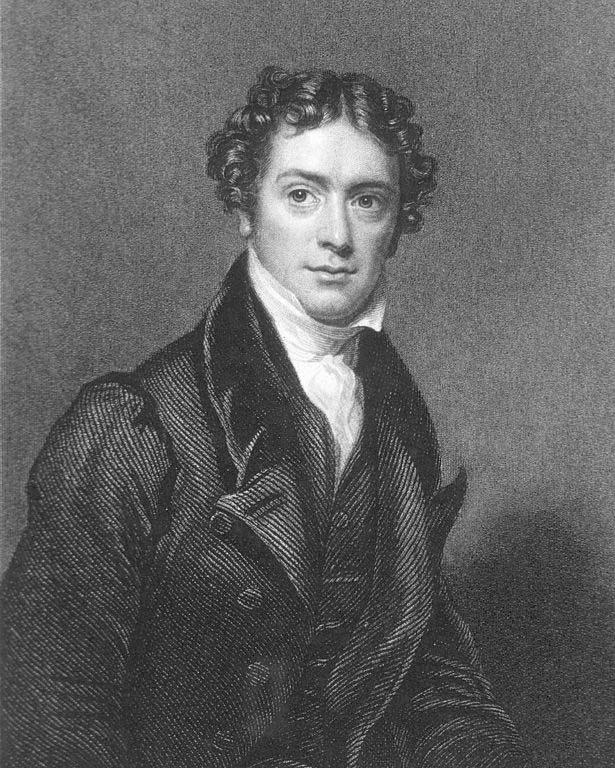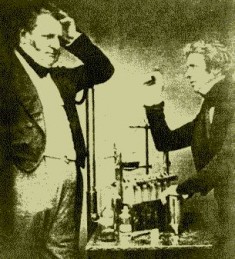| Michael Faraday | |
|---|---|
 |
|
| Scientist | |
| Specialty | Physics & Chemistry |
| Born | Sep. 22, 1791 Newington Butts, England |
| Died | Aug. 25, 1867 (at age 75) Hampton Court, Middlesex, England |
| Nationality | British |
Michael Faraday is known for his discoveries of electromagnetic rotations, electromagnetic induction, diamagnetism, and the magneto-optical effect, just to name but a few. Most popular historians regard him as one of the most influential scientists in the history of science. The brilliant scope as well as depth of his work spanned a period of six decades.
Faraday’s Early Years
Michael Faraday was born in Newington, London, in 1791. His father came from northern England while his mother, Margaret Hastwell, was also from northern England. Because his family was poor, young Faraday received little more than the primary education. At age 14, he was apprenticed to the bookbinder in London and read a number of books brought for binding, including Conversations on Chemistry by Jane Marcet.
Faraday was also one of the young Londoners who endlessly pursued an interest in science through gathering to hear lectures at the City Philosophical Society. One of the bookbinder’s clients gave Faraday free tickets to the lecture that was to be given by Sir Humphry Davy, and after attending, he conceived the goal of working for a great scientist. After hearing the lecture, he sent Sir Humphry Davy the notes he had made. As a result, he was appointed, at age 21, to be the assistant to Sir Humphry Davy in the lab of the Royal Institution in London.
Faraday’s First Assignment
Faraday’s first job was to accompany Sir H. Davy and his wife on his tours overseas, during which he at times had to be a personal servant to Sir Davy’s wife. Once back in England, he developed as a practical and analytical chemist. As Faraday’s chemical capabilities increased, Sir H. Davy give him more responsibilities.
In 1825, he replaced the ailing Davy in his duties directing the lab at the Royal Institution. He published all his work related to optical deceptions, condensation of gases, as well as the isolation of benzene. In 1833, he became Fullerian Professor of Chemistry at the Royal Institution of Great Britain, the position to which he was appointed for rest of his life.
Greatest Achievements
 During the time when he was appointed an assistant to Sir Davy, Faraday discovered two new chlorides of carbon, conducted studies on the diffusion of gases, and produced several kinds of glass intended for visual purposes. He was a great practical discoverer and among the most useful pieces of chemistry equipment he invented was the Bunsen burner. By mixing gas and air before lighting, he found an easily accessible type of higher temperature. Faraday’s model of the Bunsen burner was later developed, but it is still utilized in labs across the globe.
During the time when he was appointed an assistant to Sir Davy, Faraday discovered two new chlorides of carbon, conducted studies on the diffusion of gases, and produced several kinds of glass intended for visual purposes. He was a great practical discoverer and among the most useful pieces of chemistry equipment he invented was the Bunsen burner. By mixing gas and air before lighting, he found an easily accessible type of higher temperature. Faraday’s model of the Bunsen burner was later developed, but it is still utilized in labs across the globe.
Faraday is renowned for his contributions to magnetism and electricity. While people knew about electricity, it was Faraday who played an integral role in offering a constant source of electricity. In 1821, after being motivated by the work of Hans Christian, a Danish physicist and chemist, Faraday began experimenting with electromagnetism and through signifying the conversion of electrical energy into the motive force, he invented electric motor.
For the next several years, he continued to conduct experiments from his first electromagnetic finding. In 1831, he discovered the induction of the electric currents and made the very first electric dynamo. His electromagnetism theories proved influential in the novel electricity industry of the 19th century. In 1839, Faraday conducted many experiments to ascertain the fundamental nature of electricity and discovered that electrostatic force comprised of the field of curved lines of force and conceived a specific capacity. His other discoveries include the Faraday Cage, the Faraday Effect, and the process of diamagnetism, just to name a few.
Faraday’s Beliefs and Later Years
Faraday had very strong religious beliefs. He belonged to a very strict Christian sect known as the Sandemanian Church that was founded in the 18th century. His faith influenced his work and he used his discoveries to demonstrate the union of God and nature.
Faraday made other achievements during the later years of his life. In 1832, he was awarded a Doctor of Civil Law degree by Oxford University. He was elected to the French Academy of Sciences in 1844. Because of his great contribution to science, the government of Britain gave him a pension and a house in Hampton Court.